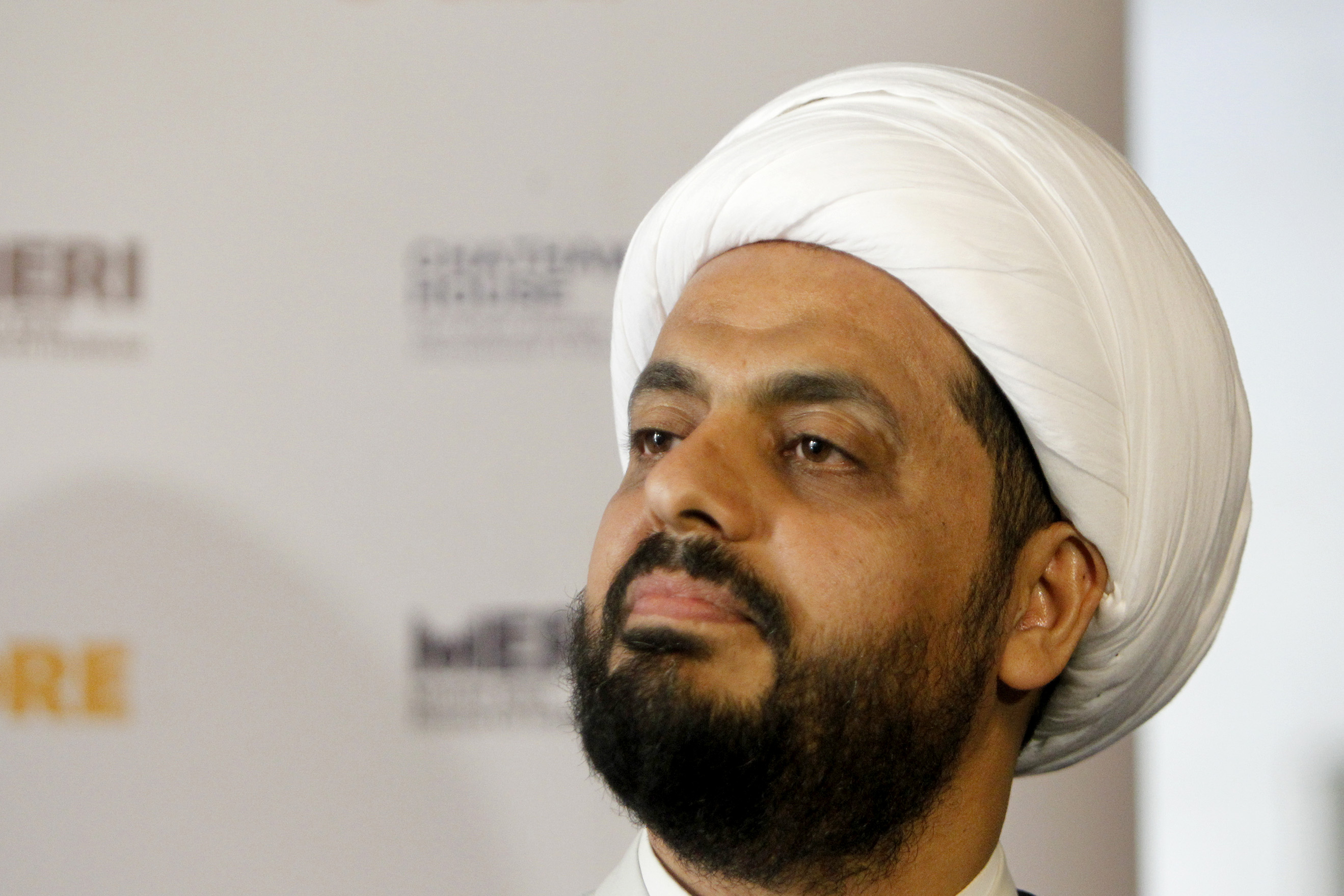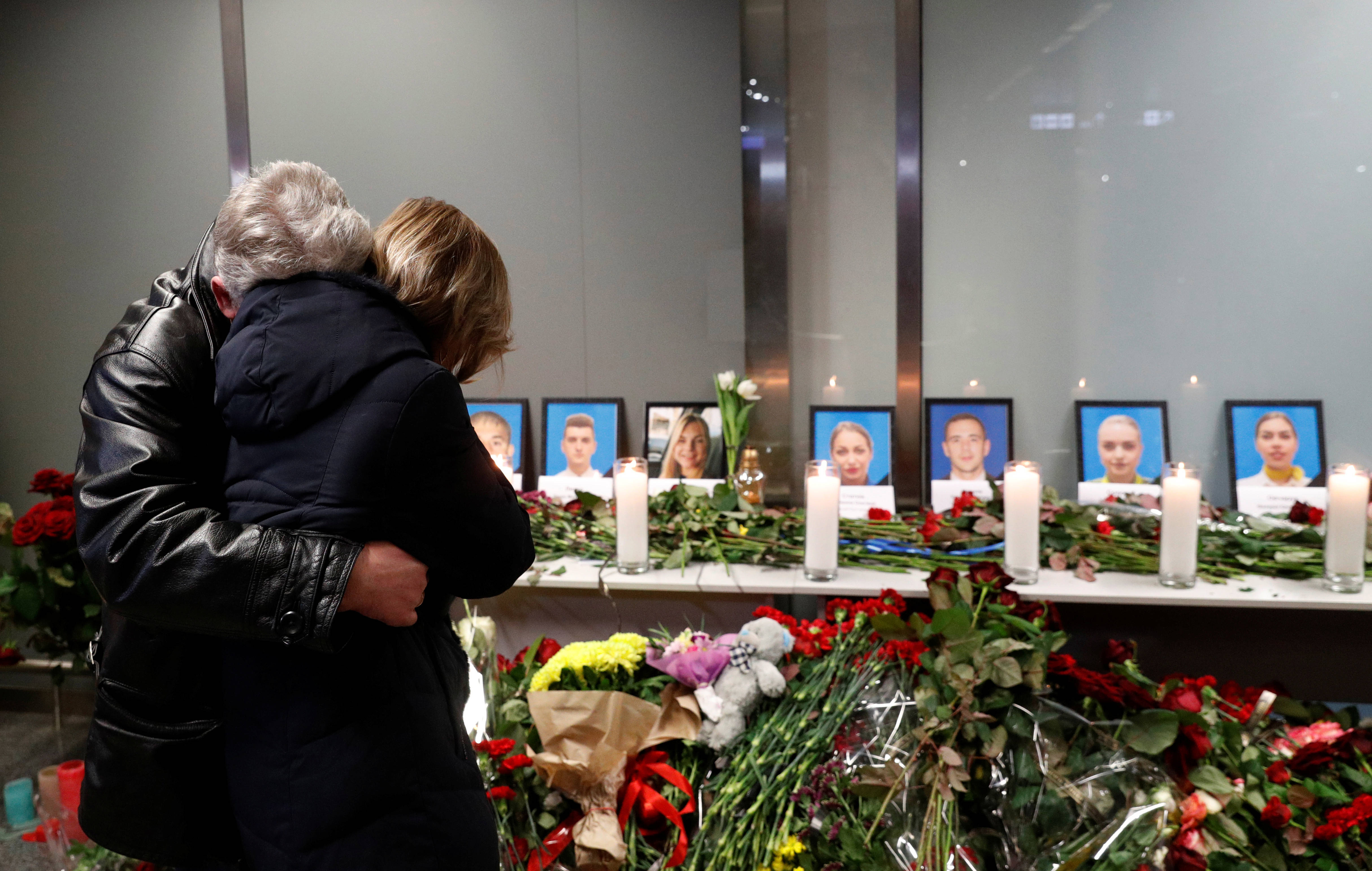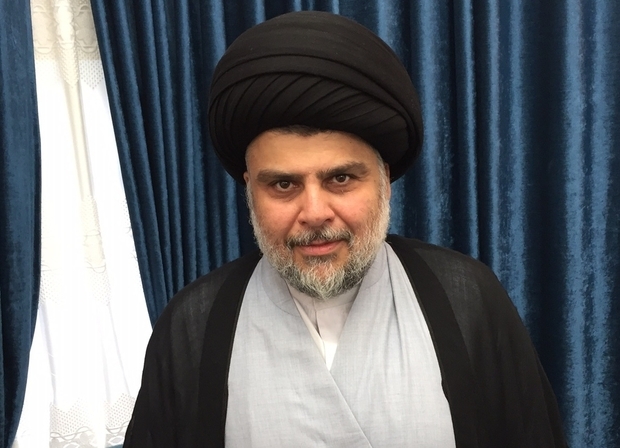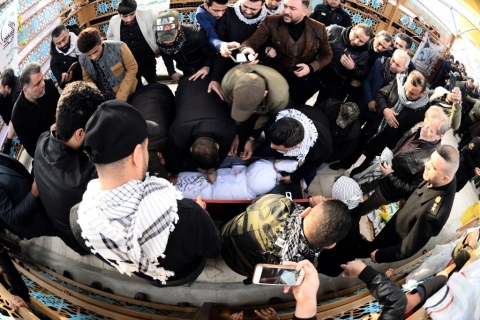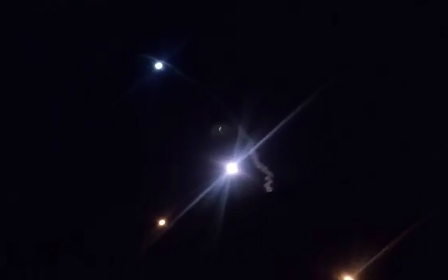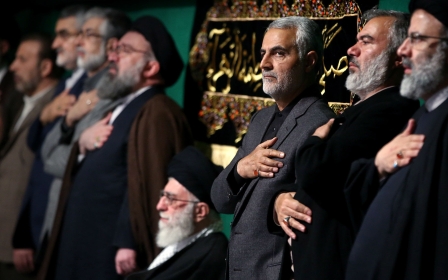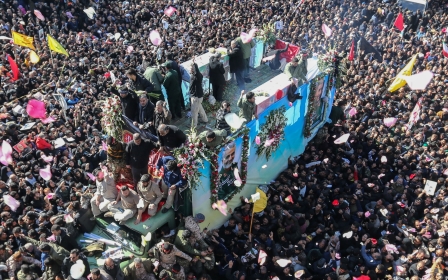Live updates: US-Iran tensions after Qassem Soleimani's killing
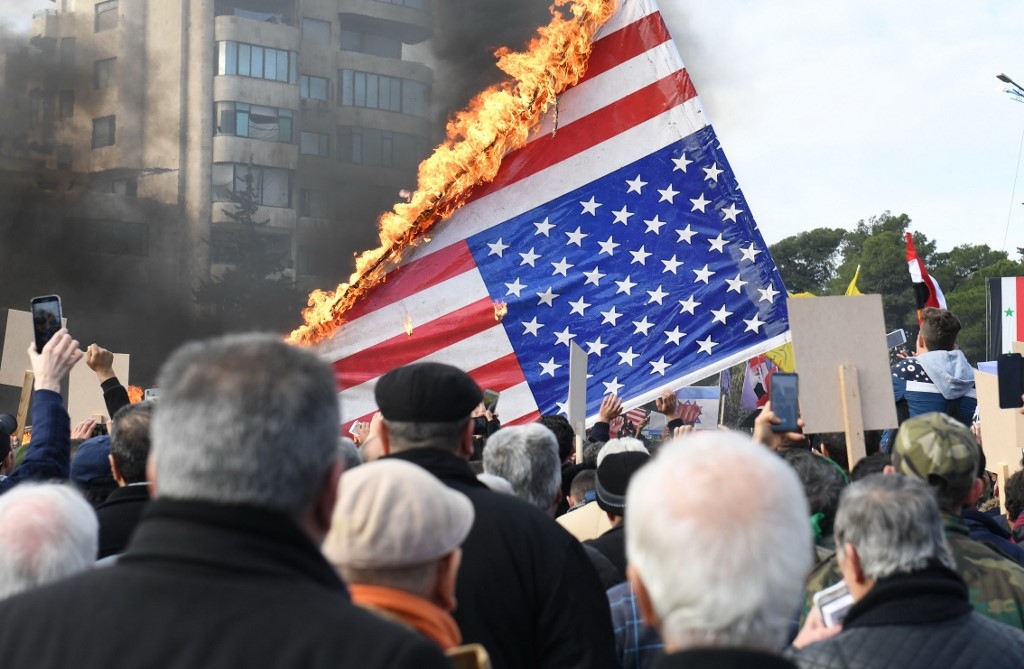
Live Updates
Qais al-Khazali, leader of the Asa'ib Ahl al-Haq militia, on Thursday announced the creation of an "Iraqi Resistance Front" with the purpose of driving American forces out of Iraq.
In a statement released on Twitter, Khazali said that the new grouping would not change the leadership of the different organisations involved, however. He did not specify which organisations would fall under the new banner.
"We find ourselves forced to carry out our duty of putting an end to the American occupation of Iraq,," he said.
"The challenge is big...and the limitation of the capabilities of official agencies in confronting the American arrogance has forced the resistance fighters to think of creating an Iraqi Resistance Front to take it upon themselves to carry out this duty.
"The objective is not to dissolve resistance factions within it under one title, but each faction will keep its leadership...the objective is to find a higher level of coordination in order to end the foreign occupation in all fields."
His comments come hours after a number of rockets struck the Green Zone in Baghdad, the fortified area which houses the US embassy, the Iraqi parliament and other official buildings. No-one was injured.
There have many such attacks over the past year in Iraq, though there are rarely claims of responsibility
Khazali said that the Iraqi Resistance Front was not responsible for the attack last night, adding that when they finally acted the response would be "nothing less" than the scale of the missiles launched by Iran at Iraqi bases on Wednesday morning.
"The US embassy being targeted by two rocket is not the work of the Iraqi Resistance Front and it is likely that the attack took place under the supervision of American intelligence…to cause confusion," he said.
Khazali has previously promised that there would be an "Iraqi response" to the killings of Iranian Quds Force leader Qassem Suleimani and Iraqi militia leader Abu Mahdi al-Mohandis, who were killed by a US air strike last week.
"Hour zero has not yet started for our revenge operations for commander Abu Mahdi al-Muhandis," said Khazali.
"We have said our response will not be lesser than the Iranian response to commander Qassem Solaimani’s assassination."
He added that his group does not target foreign missions, only military targets.
A Revolutionary Guard commander said Iran would take "harsher revenge soon" after Tehran launched missile attacks on US targets in Iraq in retaliation for last week's US killing of Iranian general Qassem Soleimani, Tasnim news agency reported on Thursday.
The agency was quoting senior commander Abdollah Araghi, speaking after US President Donald Trump said on Wednesday that Iran appeared to be "standing down" after the missile strikes that did not harm any US troops in Iraq.
In a separate report, Tasnim quoted the Guard's deputy head, Ali Fadavi, as saying Iranian missile attacks on US targets were a display of Iran's military power and said US forces "couldn't do a damn thing".
Iran's ambassador to the United Nations dismissed as "unbelievable" what he said was US President Donald Trump's call for cooperation given Washington was imposing sanctions on Tehran, Iran's state news agency IRNA reported on Thursday.
Majid Takht Ravanchi, in what appeared to be Iran's first official reaction to Trump's address after an Iranian missile attack on Iraqi bases housing US troops, was quoted as saying Washington had "initiated a new series of escalation and animosity with Iran" by killing Iranian general Qassem Soleimani last week.
Two Katyusha rockets crashed inside Baghdad's heavily fortified Green Zone, which houses government buildings and foreign missions, but caused no casualties, Iraq's military said.
Two loud blasts followed by the wailing security sirens of the compound had been heard, AFP correspondents said.
There was no immediate claim of responsibility.
According to an initial assessment of Western intelligence agencies, the Ukrainian airliner that crashed in Iran early on Wednesday was not brought down by a missile, a Canadian security source said.
The incident took place hours after Iran launched more than a dozen ballistic missiles on military bases in Iraq hosting US-coalition forces.
The source, according to Reuters, the agencies believed the Boeing 737 plane had suffered a technical malfunction. The source declined to be identified.
The Boeing 737 crashed shortly after takeoff from Tehran, killing all 176 people on board.
Here's MEE's summary at 7pm GMT of a day that saw some tensions ease following Iran's missile attacks on Iraqi bases last night:
1) Influential Shia cleric Muqtada al-Sadr has declared the "crisis" over, and called for dialogue and for Iraqi militia groups not to take any further action that could lead to an escalation. He also called for the formation of a new government in Iraq.
2) Donald Trump said that Iran appeared to be "standing down" after last night's attacks and, while promising to impose more sanctions on the country, appeared not to be proposing any military retaliation for the attack.
3) There have been no reported casualties among either Iraqi or US personnel on the two military bases struck, according to Washington and Baghdad.
4) Iraqi President Barham Salih has denounced Iran's strikes as a "violation of state sovereignty" and has warned against any further escalation that could see Iraq become a battlefield.
5) Qais al-Khazali, leader of the powerful Iran-backed Asa'ib Ahl al-Haq, has said there needs to be an "Iraqi response" to the air strikes that killed Quds Force leader Qassem Soleimani and militia leader Abu Mahdi al-Mohandis.
Influential Shia cleric Muqtada al-Sadr has said the "crisis is over" following Donald Trump's statement.
Sadr called on Iraq's militias to be patient and not start any military action, while adding that a new government should be formed in Iraq within 15 to "safeguard" Iraq's sovereignty.
"I call on the Iraqi factions to be deliberate, patient, and not to start military actions, and to shut down the extremist voices of some rogue elements until all political, parliamentary and international methods have been exhausted," he said.
He added that foreign troops still needed to be expelled from Iraq.
Though a longtime critic of Iranian influence in Iraq, Sadr fiercely condemned the airstrike last week on Qassem Suleimani and Abu Mahdi al-Muhandis and reactivated his Saraya al-Salam militia "to be ready to fully protect Iraq."
Off the heels of Iran’s retaliatory strike overnight, a top Hashd al-Shaabi commander said on Wednesday that it was time for Iraq to have its own response to avenge the assassinations.
But commanders of Iranian-backed armed factions in Iraq have told MEE’s Suadad al-Salhy that they are lost, distracted and unable to strike the US effectively right now after losing their two key leaders.
"To lose both men at the same time was a shock to all of us,” a commander who was close to Qassem Soleimani and Abu Mahdi al-Muhandis told MEE.
The faction leaders also shed light on how tightly - and personally - controlled the Hashd al-Shaabi was run under both men, why it will be so hard to replace them and the risk of infighting as the paramilitary umbrella group restructures.
Twitter has reacted as sardonically as usual to US President Donald Trump's statement on the Iran missile attacks:
US President Donald Trump has promised new sanctions on Iran following the missile strike the country carried out against military bases in Iraq.
"No Americans were harmed in last nights attack by the Iranian regime," said Trump, in a press conference.
"We suffered no casualties - all of our soldiers are safe and only minimal damage was sustained at our military bases. Our great America forces are prepared for anything."
Trump said the US would "immediately impose additional punishing economic sanctions on the Iranian regime" following the attack.
"Iran appears to be standing down which is a good thing for all," he added.
He added that he would like to work in future with Iran against its "natural enemy" the Islamic State group.
"To the people and leaders of Iran - we want you to have a future and a great future, one that you deserve, one of prosperity at home and harmony with the nations of the world," he said.
"The United States is ready to embrace peace with those who seek it.”
US President Donald Trump is set to make a statement on the Iranian missile attacks at 11am (4pm GMT).
So far, Trump has only made a statement on Twitter about the attacks where he declared that "all is well":
In a column for Middle East Eye, historian Pouya Alimagham has argued that "Iranians and Iraqis have come together in solidarity" over the death of Iranian Quds Force leader Qassem Suleimani.
"As with any military commander who fought in wars, Soleimani had allies and enemies. As such, there were those who welcomed his assassination - a welcome that CNN played on loop when a sparsely populated, spontaneous march in Syria's Idlib celebrated his demise.
"But the real surprise was the groundswell of solidarity that his death generated. His body was not immediately returned to Iran to receive burial rites; rather, he was kept in Iraq so that regular Iraqis and the militiamen he backed could take his coffin to Iraq’s shrine cities, including Najaf and Karbala, the hallowed grounds of Shia Islam.
"Throngs of Iraqis gathered to commemorate him and Abu Mahdi al-Muhandis, the leader of the Kataib Hezbollah militia who was also killed in the US strike."
A Pentagon source has told CNN that the US believes Iran deliberately avoided striking targets in Iraq that could lead to loss of life.
Jake Tapper, an anchor at CNN, tweeted that he had been told the assessment was Iran's plan was “deliberate targets, minimum damage, maximum warning/effect.”
So far there have been no reported US or Iraqi casualties from the attacks, which hit the Ain al-Asad base in Anbar province and another base in Erbil.
Iraqi President Barham Salih has condemned Iran's attack on military bases in Iraq, describing it as a "dangerous development."
"We denounce the Iranian missile bombing that hit military installations on Iraqi territory and renew our rejection of the repeated violation of state sovereignty and the transformation of Iraq into a battlefield for warring sides," his office said in a statement.
Former Prime Minister Haider al-Abadi also condemned the attack in a statement on Facebook.
"We previously condemned the American violations of Iraqi sovereignty, and today we condemn the Iranian violation of Iraqi sovereignty," he said.
"We are not enemies of anyone, and we request friendship and cooperation with all countries of the world on the basis of common interests.
"We affirm our rejection of any international conflicts or settlement of international accounts at the expense of Iraqi blood, land, and sovereignty...we call for national unity and solidarity, and to make the interests of Iraq and the safety of its people a red line in our policies."


